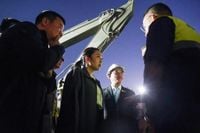In recent days, the Thai public has been riveted by news of an earthquake in Myanmar, which resulted in the collapse of the new headquarters of the Office of the Auditor General (OAG) under construction, causing numerous injuries and missing persons. Amidst this turmoil, the government led by Prime Minister Phatongthar Shinawatra has hastily pushed forward a draft law known as the "Comprehensive Entertainment Business Act" or the "Casino Law," presenting it for consideration by the House of Representatives. Alarmingly, Speaker Wan Nor Muhamad Nor Mata has expedited the process, scheduling it as a "special agenda" for April 3, instead of April 9, as previously stated by government whip Wisutthi Chaiyanarun. This rush raises questions about the urgency and importance of casinos to the government and parliament.
The swift movement has sparked a significant backlash from various sectors, with over 100 civil society organizations submitting letters to Speaker Wan Nor, alongside opposition leaders, urging representatives to reject the principles of the casino bill. Concurrently, numerous other groups opposing the law have publicly declared their stance, including the Friends of Mahidol for Society, the Senior Physicians and Medical Personnel Association, and 163 former senators, all calling for the urgent proposal to be halted due to potential severe ramifications. The online community has also voiced widespread dissent.
Thanakorn Khomkrit, Secretary-General of the Foundation for a Gambling-Free Society, revealed that the government's rush to push this bill during a time of crisis, such as the earthquake, appears suspicious. He criticized the government for seemingly ignoring the pressing needs of the public while prioritizing legislation that many view as detrimental. “This act is dishonest,” he stated, pointing out that while the government claims to promote tourism, it is simultaneously enforcing casinos that contradict this narrative.
In a similar vein, Dr. Phichai Rattanadilok Na Phuket, Director of the Political and Development Strategy Program at the National Institute of Development Administration (NIDA), expressed his thoughts on Facebook, highlighting the absurdity of pushing forward a casino bill while the nation is reeling from disaster. He noted that the government’s focus on opening casinos seems misplaced, as it does little to address pressing issues like corruption in state projects or the infiltration of dubious Chinese investments.
He further lamented, “The people who are homeless due to the earthquake or those awaiting disaster relief are unlikely to find solace in a government fixated on turning Thailand into a Las Vegas.”
The urgency with which the government is advancing the casino bill, disregarding the opposition from over 100 civil society organizations, has been described as a slap in the face to the public. Dr. Phichai emphasized that this reflects the government's disinterest in the voices of those genuinely suffering, instead catering to investors and capitalists. “If the government continues down this path, do not be surprised if the people lose faith and rise up to demand justice,” he warned.
Adding to the critical discourse, Associate Professor Nualnoi Treerat, Director of the Gambling Problems Study Center at Chulalongkorn University, remarked, “Let’s look at the casinos around us. They are failing and have become sources of scams that return to Thailand. Just look at the situation in Sa Kaeo, where the buildings meant for casinos are often fronts for fraudulent activities.”
The government’s focus on casino legislation comes at a time when many are questioning its response to the recent earthquake, particularly the slow implementation of an effective warning system. Critics have noted that while the government is quick to advance casino legislation, it has lagged in establishing a reliable earthquake warning system, leading to public frustration.
As Thailand grapples with the aftermath of the earthquake and the looming threat of new tariffs imposed by the United States, which could see Thai exports taxed up to 36%, the urgency for a robust economic response is palpable. Samchai Phurichayachai, a consultant to the Thai Chamber of Commerce, emphasized the potential fallout from these tax measures, stating, “Today, no agency is moving. There are no measures in place, and how will we survive?”
In light of these challenges, Samchai advocates for a "Thailand First" policy to foster self-reliance and resilience within the economy. He argues that Thailand must transition from being merely a production base for foreign companies to a nation capable of creating value within its borders. “If the government remains stagnant, we risk becoming merely a transit country without global significance,” he warned.
As the government deliberates its next steps, the call for immediate action to support local industries and agriculture is growing louder. With the global landscape fraught with economic challenges, including wars and frequent disasters, the need for a coherent strategy to support Thai businesses is more crucial than ever.
As the debate over the casino bill continues, the opposition within the parliament has also intensified. On April 3, the People's Party submitted a motion to postpone discussions on the casino legislation for a week, citing the overwhelming public dissent. However, the ruling party, which has been under increasing pressure, faced significant pushback from opposition members who argued that the bill lacked thorough research and should not take precedence over other legislative measures.
Wirote Lakkhanaadisorn, a member of the parliament, highlighted the necessity for a debate on why the Entertainment Complex bill was prioritized over other pressing issues, stating, “We need to understand the rationale behind this urgency.” Yet, the opposition's request for discussion was met with resistance, as the ruling party sought to maintain momentum on the bill.
Despite the chaos within the parliament, the Speaker of the House, Wan Nor, defended the decision to include the casino bill in the special agenda, asserting that the cabinet’s urgency warranted its inclusion. Meanwhile, Prime Minister Phatongthar Shinawatra attempted to quell concerns by stating that the legislative process would unfold naturally, and discussions with coalition partners were ongoing.
As the government navigates this complex landscape, the casino bill remains a contentious topic. While some see it as a potential economic boon, many citizens and organizations remain skeptical, fearing the societal consequences that may arise from such legislation. The public's outcry against the casino bill serves as a reminder of the need for transparency and accountability in government actions, especially during challenging times.






